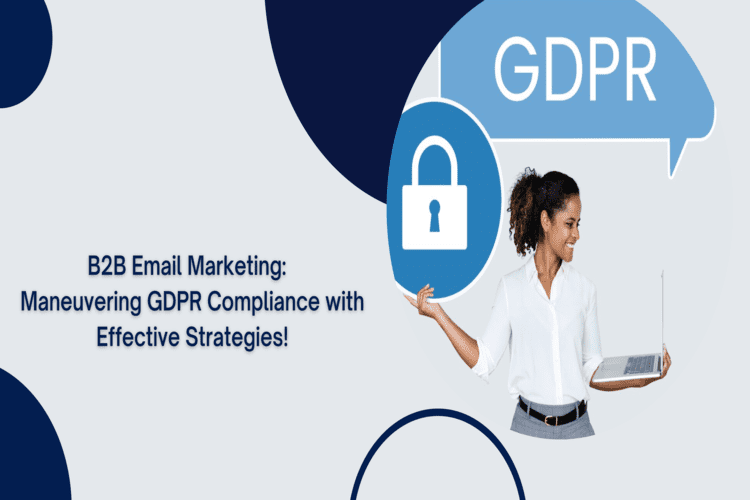
B2B Email Marketing: Maneuvering GDPR Compliance with Effective Strategies!
Email marketing is still highly effective for B2B companies in today’s online environment. With the advent of the General Data Protection Regulation (GDPR), however, it is critical for company executives to appreciate the significance of compliance in safeguarding consumer data and sustaining confidence.
Compliance with data protection requirements like the General Data Protection Regulation (GDPR) is critical for the sales and marketing process in today’s business world, when data has become a significant asset for Enterprises. The General Data Protection Regulation (GDPR), which went into effect in the European Union (EU) in May of 2018, is intended to safeguard individuals personal data and govern its processing by businesses.
To prevent financial penalties and reputational harm, GDPR compliance also helps build trust with customers. Companies who show they take data privacy seriously and are willing to comply with GDPR can gain trust and loyalty from their consumers. Sales and marketing rely heavily on the legal framework provided by data compliance for the collection, processing, and storage of client Data. According to the General Data Protection Regulation (GDPR), businesses need people’s permission to process their personal data.
Customers will have agency over their data and knowledge of its intended use if this is implemented. Businesses may target the proper Customers while also upholding their right to privacy by adjusting their marketing strategy to comply with GDPR regulations. In addition, GDPR encourages openness by mandating that businesses provide transparent explanations of their data practices, empowering customers to make well-informed choices when disclosing personal data.
Data compliance not only protects people’s privacy, but it also improves the quality of data utilized in sales and marketing. GDPR requires businesses to have correct and latest client records, guaranteeing that they have trustworthy data with which to conduct efficient targeted and tailored marketing. Businesses may increase data quality, decrease redundancy, and tighten security by conforming to GDPR, which in turn streamlines Data Management procedures. In turn, this helps businesses learn more about their customers’ tastes, habits, and buying tendencies, which in turn allows them to provide more relevant and effective marketing campaigns.
Lets dive into the ins and outs of B2B email marketing compliance with the General Data Protection Regulation (GDPR):
1. Gain Consent and Transparency:
The foundation of GDPR compliance lies in obtaining explicit consent from your Email Subscribers. Gone are the days of pre-ticked boxes or hidden opt-ins. By implementing a clear and concise opt-in process, you not only respect your customers privacy rights but also build a transparent relationship with them. Make sure to inform your subscribers about the purpose of collecting their data, how you will use it, and their rights as data subjects.
2. Data Protection and Security:
GDPR places great emphasis on safeguarding personal data. It is your responsibility to ensure that the Data you collect and store is secure. Implement stringent security measures such as encryption, regular data backups, and restricted access to sensitive information. By prioritizing data protection, you demonstrate your commitment to maintaining the privacy and trust of your customers.
3. Conduct Data Audits:
Performing regular data audits is crucial to ensure compliance with GDPR. It enables you to identify and rectify any gaps in Data Collection, storage, and processing practices. Review your email marketing databases, CRM systems, and any third-party service providers to ensure they meet GDPR requirements. Regularly update and delete outdated or unnecessary data to reduce the risk of non-compliance.
4. Opt-Out and Data Subject Rights:
Under GDPR, individuals have the right to access, rectify, and erase their personal data. As a business, you must provide easy-to-use mechanisms for subscribers to exercise these rights. Include an unsubscribe link in every email and make it simple for recipients to update their preferences or delete their data. Respecting these rights not only complies with the law but also helps you maintain a positive brand image and customer loyalty.
5. Train and Educate Your Team:
GDPR compliance is a collective effort that requires your entire team’s involvement. Conduct regular training sessions to ensure everyone understands the importance of data protection and how to handle Personal Data securely. Designate a Data Protection Officer (DPO) or a responsible person within your organization who will oversee GDPR compliance and keep updated with the latest regulations.
6. Trustworthy Partners:
If you rely on third-party service providers for Email Marketing or data processing, it is crucial to collaborate with trustworthy partners who also comply with GDPR regulations. Ensure that your contracts with these vendors include provisions for data protection and processing obligations. Conduct due diligence to assess their compliance practices and maintain a proactive approach in managing your partnerships.
7. Data Minimization:
One of the key principles of GDPR is data minimization, which states that businesses should only collect and process the necessary personal data required to achieve the intended purpose. Take a critical look at your Email Marketing strategies and assess if you are gathering excessive information from your subscribers. Streamline your data collection process to include only essential details that directly contribute to your marketing objectives. By practicing data minimization, you not only reduce the risk of non-compliance but also enhance the efficiency of your Email Campaigns.
8. Segment Your Email Lists:
Segmentation is a powerful technique in B2B Email marketing that allows you to target specific groups of subscribers based on their interests, preferences, or buying behaviors. GDPR compliance can actually help you improve your segmentation strategies. By obtaining explicit consent and understanding your subscribers preferences, you can create tailored email content that resonates with each segment. This not only increases the relevance and engagement of your emails but also demonstrates your commitment to personalized marketing while respecting privacy regulations.
9. Double Opt-In:
To further strengthen your GDPR compliance efforts and ensure the accuracy of your email lists, consider implementing a double opt-in process. With double opt-in, subscribers are required to confirm their email addresses by clicking on a verification link sent to their inbox. This additional step reduces the risk of fake or incorrect email addresses being added to your Database. It also provides you with documented proof of explicit consent, offering an extra layer of protection in case of compliance audits.
10. Respond to Data Breaches:
Even with the best security measures in place, data breaches can still occur. It is essential for business leaders and executives to establish a robust incident response plan to promptly address and mitigate any Data Breaches that may occur. Familiarize yourself with the GDPR requirements for reporting data breaches and inform the relevant authorities and affected individuals within the specified timeframe. By demonstrating a proactive and transparent approach to handling data breaches, you can maintain trust and credibility with your customers.
11. Stay Alert:
GDPR is not a static regulation, and it is important to stay informed about any updates or changes in data protection laws. Subscribe to reputable industry newsletters, attend relevant conferences or webinars, and follow regulatory bodies announcements to ensure that your Email Marketing Strategies remain compliant. Being proactive in adapting to evolving regulations demonstrates your commitment to privacy and positions your business as a leader in data protection.
End Point:
B2B email marketing can be a highly effective tool for engaging with your target audience, driving conversions, and nurturing customer relationships. By maneuvering GDPR compliance with effective strategies, you can not only protect personal data and uphold the trust of your customers but also unlock the full potential of your email marketing Campaigns. Embrace the principles of consent, transparency, and data protection, and leverage segmentation and data minimization techniques to deliver personalized and relevant content. Stay vigilant, train your team, collaborate with trustworthy partners, and adapt to evolving regulations to ensure ongoing compliance and success in your B2B email marketing endeavors.
Even in the age of GDPR, B2B Emails List may be a very successful approach for business growth and client engagement. Building trust with your demographic, safeguarding their personal information, and boosting your brand’s image are all possible when you employ the proper techniques and stay in line with GDPR regulations. Remember that protecting your customers personal data is crucial to gaining their confidence and maintaining their loyalty, not just because it’s the law. Consider GDPR compliance a chance to improve your company’s Email Marketing and get real results.


